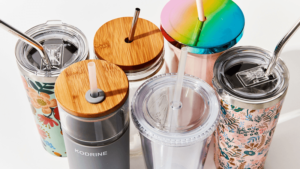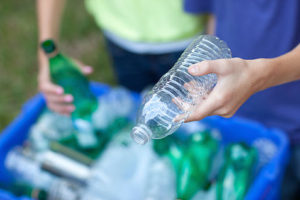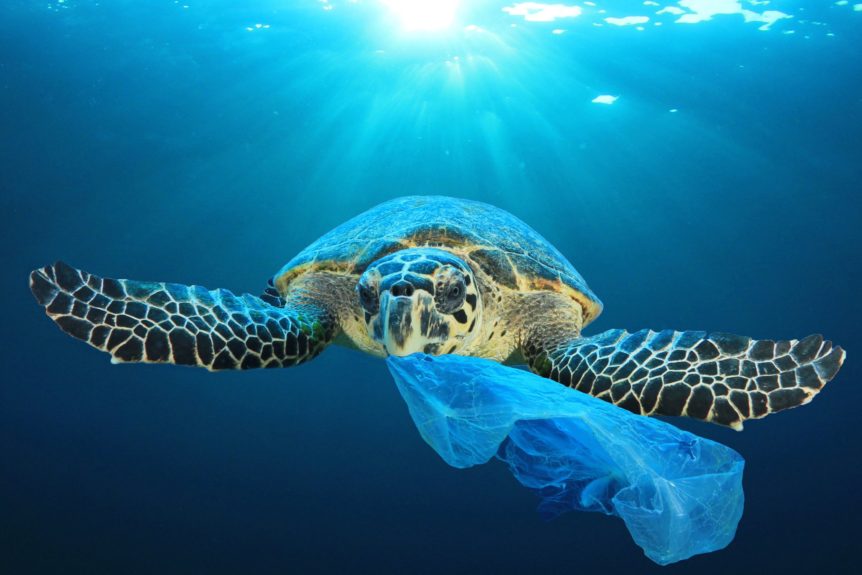Reducing your plastic use sounds like a noble action, but daily plastic use can be a difficult habit to break, especially if you’re not sure where to start. The average American goes through about 185 pounds of plastic per year. That may sound like an absurd number but think of all the little plastic items you toss in the trash every day. What about that iced coffee cup and straw? And your to-go container from the restaurant you went to earlier? How about all those little plastic bags you put your produce in at the grocery store? Recycling is great, but avoiding plastic all together is definitely a better option.
Little things like your daily single-serve coffee cup may not seem like much, but over time, they can really add up. It may sound like a daunting task, but a little mindful shopping can put you on the path to a plastic-free life. If you’re ready to take a step in a greener direction, here are a few tips on getting started.
 Reusable Beverage Containers
Reusable Beverage Containers
This is probably the biggest source of plastic waste in many homes. That morning latte and all those plastic bottles of water add up quickly, as do all those plastic straws. Thankfully, it’s incredibly easy to avoid falling into the plastic beverage container trap.
Reusable coffee mugs, iced drink containers, and water bottles are relatively inexpensive, and you can take them everywhere. They come in different sizes, materials, and colors, so you can be sure to find exactly what you need. As a bonus, most reusable beverage cups will keep your drink at the ideal temperature for much longer than that disposable cup. Most coffee shops will be happy to put your drink in a reusable cup for you, too. If you’re worried about forgetting your water bottle or coffee cup at home, buy a few and keep an extra in your car.
Buy in Bulk
Have you ever considered how much plastic you bring into your home every time you go grocery shopping? Your favorite cereal, snacks, and pantry basics are probably all packaged in plastic bags. If the majority of your shopping comes home covered in plastic, it’s time to reconsider your favorite products. All this wasteful packaging can be avoided by shopping in your local grocery store’s bulk food section. If your favorite grocery store doesn’t have everything you need, try doing an online search for a bulk or zero-waste store in your area. These stores are rising in popularity as people realize they can actively take part in making the world a cleaner place. Bulk stores often carry more than pantry staples, too. You may be able to buy shampoo, lotion, laundry detergent, eco-friendly cleaning products, and more.
Buying in bulk won’t reduce your plastic usage unless you’re willing to bring your own reusable containers. Mason jars and fabric bags are ideal for bulk shopping. Just make sure you know the tare weight of each of your containers. The tare weight is how much the empty container weighs. This number is important because the cashier will be able to subtract it from the weight of the filled container, so you’ll only be paying for the product, not the container. Putting a label on the container or writing the tare weight on it in permanent marker can save you time at checkout.

Shop Differently
You’ll need to create new shopping habits if you want to eliminate plastic from your shopping trips. The most important step (and easiest to forget) is to bring your own shopping bags. Reusable bags come in any shape, size, and appearance, so find some that work for you. In addition to limiting your use of plastic, reusable bags are much sturdier than plastic bags, meaning your groceries won’t burst out the bottom of the bag halfway to your car. Just remember to put them back in the car when you’re done putting everything away.
If you’re one of those people that put each type of their fruits and vegetables in individual plastic bags, consider investing in reusable produce bags. These bags are usually lightweight, breathable, and already labeled with the tare weight. They’ll keep your apples from rolling away while keeping plastic out of your home.
Reusable Storage
Once you’ve gotten your groceries home, it’s time to consider how much plastic you use to store everything. Plastic cling wrap and disposable plastic bags are cheap, convenient, and horrible for the environment. Luckily, there are so many greener options available.
If you use a lot of disposab le plastic sandwich and snack bags, consider investing in reusable silicone bags. These bags are usually dishwasher safe and easy to clean. They can be a little expensive up-front but consider how much you spend on disposable bags in a year and you’ll likely see little difference. However, these bags can be used for years, rather than days, so you’ll likely save a significant amount of money in the long run. For larger items, consider glass or Pyrex containers. They’re great for storing your bulk purchases, and they’re see-through, so you know when you need to buy more.
le plastic sandwich and snack bags, consider investing in reusable silicone bags. These bags are usually dishwasher safe and easy to clean. They can be a little expensive up-front but consider how much you spend on disposable bags in a year and you’ll likely see little difference. However, these bags can be used for years, rather than days, so you’ll likely save a significant amount of money in the long run. For larger items, consider glass or Pyrex containers. They’re great for storing your bulk purchases, and they’re see-through, so you know when you need to buy more.
Beeswax food wraps are another great way to reduce plastic use in your home. They usually come in a set, and you can buy them in a variety of sizes and colors. You can even make your own if you’re feeling crafty. Rumor has it that Trader Joe’s carries a relatively inexpensive set as well.
Recycle Everything
Yes, we all know recycling is important, but are you recycling everything you possibly can? We all know you can recycle cardboard boxes, aluminum cans, and glass bottles, but knowing exactly what products your local recycling center accepts can maximize your recycling. Call your local recycling center or check their website for a complete list of what they accept. If you see items on their non-recyclable list that you know can be recycled, do an internet search for other companies in your area. You may have to drop those items off, rather than have them picked up from your house, but it’s better than throwing them into a landfill.
If the thought of completely eliminating plastic from your daily routine sounds impossible, just remember to reduce your use one step at a time. Before you know it, you’ll be living a plastic-free life! What steps have you already taken to reduce your plastic usage?


